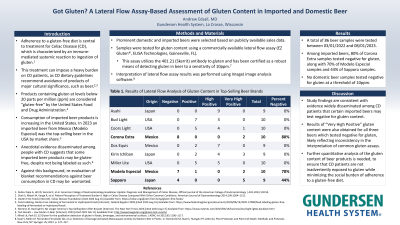Tuesday Poster Session
Category: Small Intestine
P4934 - Got Gluten? A Lateral Flow Assay-Based Assessment of Gluten Content in Imported and Domestic Beer
Tuesday, October 29, 2024
10:30 AM - 4:00 PM ET
Location: Exhibit Hall E

Has Audio

Andrew Edsall, MD
Gundersen Medical Foundation
La Crosse, WI
Presenting Author(s)
Andrew Edsall, MD
Gundersen Medical Foundation, La Crosse, WI
Introduction: Adherence to a strict gluten-free diet is the cornerstone of treatment for Celiac Disease (CD), which is characterized by an immune-mediated systemic reaction to ingestion of gluten. This treatment can impose a heavy social burden on CD patients. Major CD dietary guidelines recommend avoidance of products of cultural significance, such as beer. Consumption of imported beer products has increased rapidly in the United States, and in 2023 an imported beer from Mexico (Modelo Especial) was the top-selling beer in the USA by market share. Products containing gluten at levels below 20 parts per million (ppm) are considered “gluten-free” by the United States Food and Drug Administration. Anecdotal evidence disseminated widely on websites targeted at people with CD suggests that some imported beer products may be gluten-free, despite not being labeled as such. Given the belief among some CD patients that imported beers are gluten-free, and the ongoing increase in consumption of these products, a re-evaluation of blanket recommendations against consumption of beer in CD is warranted.
Methods: Prominent domestic and imported beers were selected based on publicly available sales data. Samples were tested for gluten content using a commercially available lateral flow assay, which has been certified as a robust means of detecting gluten in beer to a sensitivity of 10ppm. Interpretation of lateral flow assay results was performed using ImageJ image analysis software.
Results: A total of 86 beer samples were tested between 03/01/2022 and 08/01/2023. Results are displayed in Table 1. Among imported beers, 80% of Corona Extra samples tested negative for gluten, along with 70% of Modelo Especial samples and 44% of Sapporo samples. No samples of domestic beers tested negative for gluten at a threshold of 10ppm.
Discussion: Study findings are consistent with evidence widely disseminated among CD patients that certain imported beers may test negative for gluten content. Notably, sample results of “Very High Positive” gluten content were also obtained for all three beers which tested negative for gluten, likely reflecting inconsistency in the interpretation of commonly-used lateral flow gluten assays. Further quantitative analysis of the gluten content of beer products is needed, to ensure that CD patients are not inadvertently exposed to gluten while minimizing the social burden of adherence to a gluten-free diet.
Note: The table for this abstract can be viewed in the ePoster Gallery section of the ACG 2024 ePoster Site or in The American Journal of Gastroenterology's abstract supplement issue, both of which will be available starting October 27, 2024.
Disclosures:
Andrew Edsall, MD. P4934 - Got Gluten? A Lateral Flow Assay-Based Assessment of Gluten Content in Imported and Domestic Beer, ACG 2024 Annual Scientific Meeting Abstracts. Philadelphia, PA: American College of Gastroenterology.
Gundersen Medical Foundation, La Crosse, WI
Introduction: Adherence to a strict gluten-free diet is the cornerstone of treatment for Celiac Disease (CD), which is characterized by an immune-mediated systemic reaction to ingestion of gluten. This treatment can impose a heavy social burden on CD patients. Major CD dietary guidelines recommend avoidance of products of cultural significance, such as beer. Consumption of imported beer products has increased rapidly in the United States, and in 2023 an imported beer from Mexico (Modelo Especial) was the top-selling beer in the USA by market share. Products containing gluten at levels below 20 parts per million (ppm) are considered “gluten-free” by the United States Food and Drug Administration. Anecdotal evidence disseminated widely on websites targeted at people with CD suggests that some imported beer products may be gluten-free, despite not being labeled as such. Given the belief among some CD patients that imported beers are gluten-free, and the ongoing increase in consumption of these products, a re-evaluation of blanket recommendations against consumption of beer in CD is warranted.
Methods: Prominent domestic and imported beers were selected based on publicly available sales data. Samples were tested for gluten content using a commercially available lateral flow assay, which has been certified as a robust means of detecting gluten in beer to a sensitivity of 10ppm. Interpretation of lateral flow assay results was performed using ImageJ image analysis software.
Results: A total of 86 beer samples were tested between 03/01/2022 and 08/01/2023. Results are displayed in Table 1. Among imported beers, 80% of Corona Extra samples tested negative for gluten, along with 70% of Modelo Especial samples and 44% of Sapporo samples. No samples of domestic beers tested negative for gluten at a threshold of 10ppm.
Discussion: Study findings are consistent with evidence widely disseminated among CD patients that certain imported beers may test negative for gluten content. Notably, sample results of “Very High Positive” gluten content were also obtained for all three beers which tested negative for gluten, likely reflecting inconsistency in the interpretation of commonly-used lateral flow gluten assays. Further quantitative analysis of the gluten content of beer products is needed, to ensure that CD patients are not inadvertently exposed to gluten while minimizing the social burden of adherence to a gluten-free diet.
Note: The table for this abstract can be viewed in the ePoster Gallery section of the ACG 2024 ePoster Site or in The American Journal of Gastroenterology's abstract supplement issue, both of which will be available starting October 27, 2024.
Disclosures:
Andrew Edsall indicated no relevant financial relationships.
Andrew Edsall, MD. P4934 - Got Gluten? A Lateral Flow Assay-Based Assessment of Gluten Content in Imported and Domestic Beer, ACG 2024 Annual Scientific Meeting Abstracts. Philadelphia, PA: American College of Gastroenterology.
